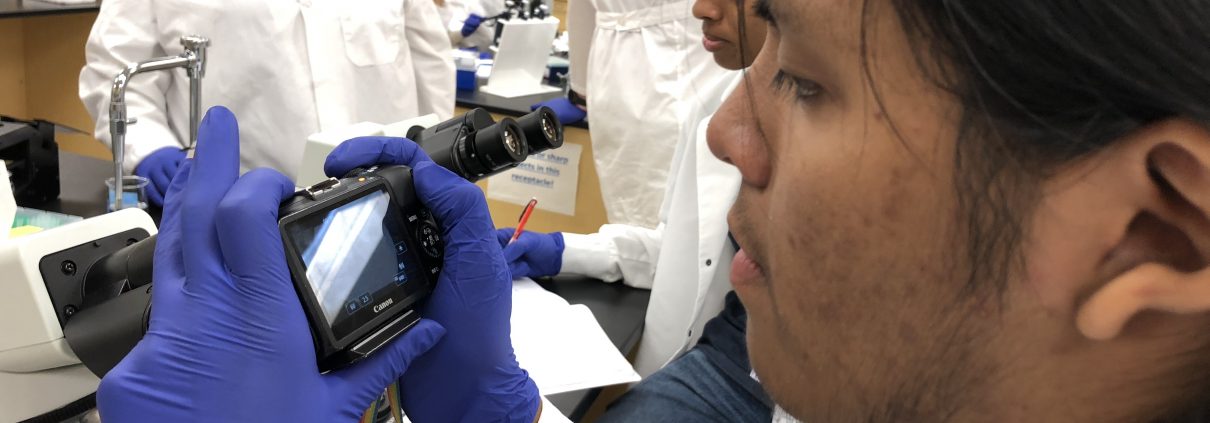Science SPYS
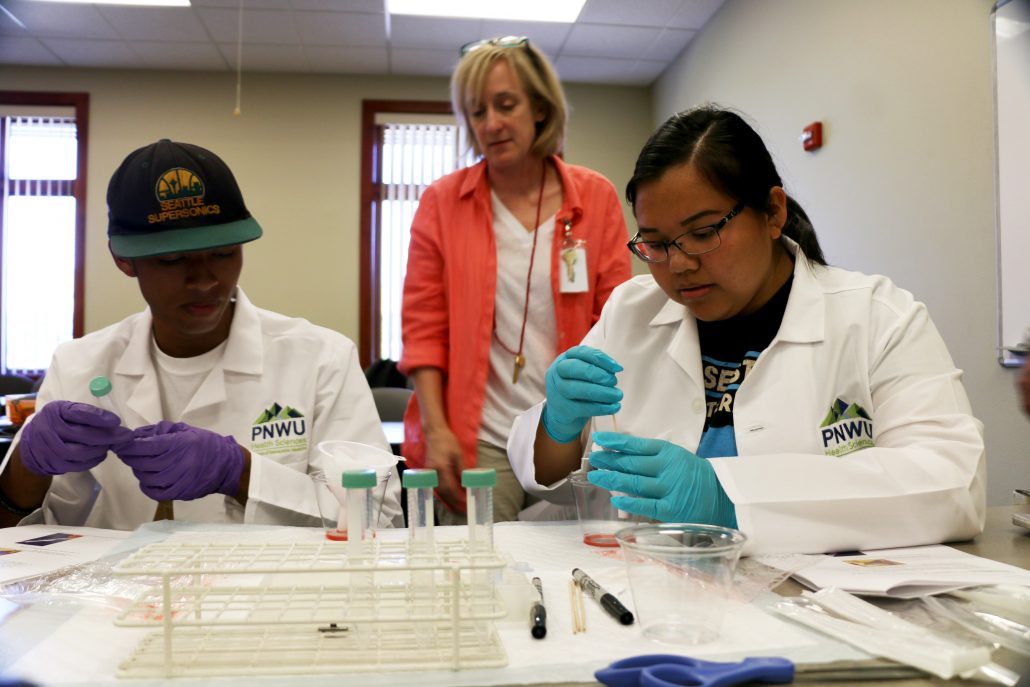
Dr. Julie Randolph-Habecker from PNWU talks Trino Savala and Kanani Heemsah, both students at Yakama Nation Tribal School, through the extraction of DNA from strawberries.
White Swan High School eleventh grader Joselin Villanueva wants to be an obstetrician. Her friend and classmate Christina Vasquez wants to be a cardiothoracic surgeon. Both girls are bright, articulate and passionate about their education and career goal. Still, the deck is stacked against them. Statistically, they are among the population that is most at risk for low academic attainment. They come from one of the most economically disadvantaged communities in the state of Washington, are persons of color, and neither girls’ parents have a college degree. However, behind these young women is a team of educators determined to give them every opportunity to break away from statistics to find their own personal success.
Villanueva and Vasquez were two of ten students who participated in the Heritage University and Pacific Northwest University of Health Sciences’s (PNWU) joint Summer Program for Yakama Students (SPYS) research experience. The youth spent 40 hours a week for five weeks immersed in science and culture at the two universities.
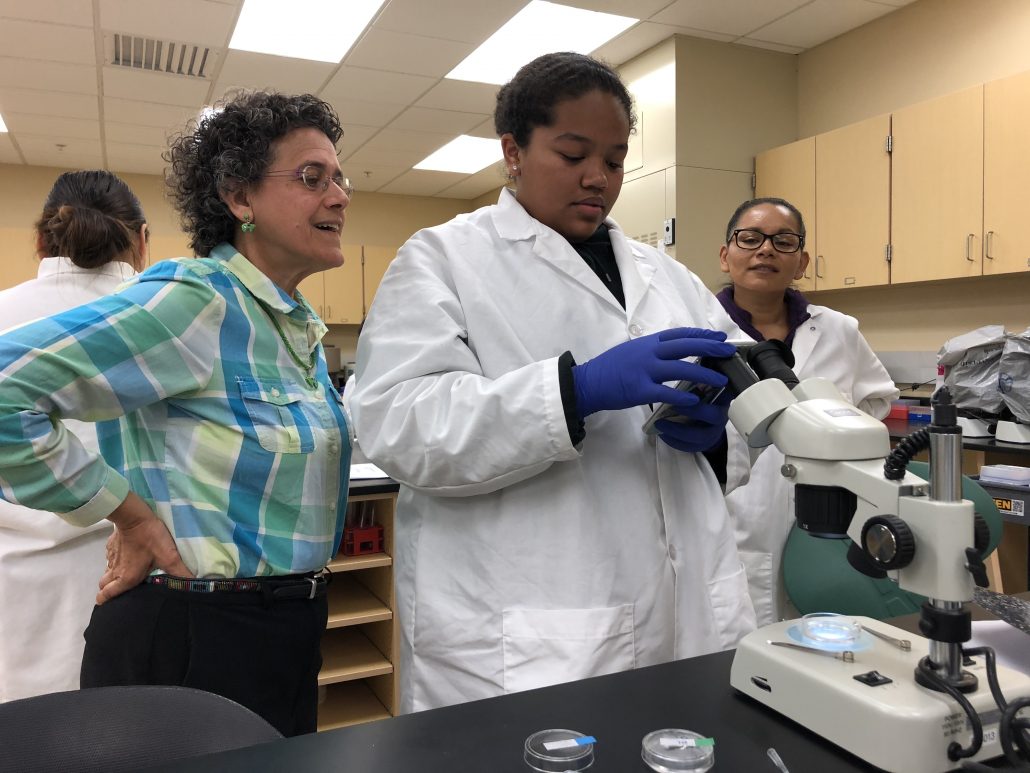
Dr. Mirna Ramos-Diaz (left) and Heritage student mentor Mireya Cruz (right) look on as Yakama Nation Tribal School student Isela Cuevas works with the microscope in the university’s lab.
Their experience started at Heritage where they were introduced to biology and chemistry. They spent time in the laboratory examining single-celled organisms through the microscope and learning how to use pipets. After a week at Heritage, they spent the next two weeks at PNWU learning about the scientific method and how to design, execute and present an experiment. They studied cells and mitosis, isolated salmon DNA, and were introduced to viral and bacterial illnesses. During their second week at the medical school, they delved into the human brain and central nervous system. They dissected sheep brains and cows eyes to get a better understanding of the nervous system and reviewed case studies on Alzheimer’s disease and autism. Peppered into their studies were lectures and conversations from Native American medical and environmental scientists from throughout the nation who shared with them a bit about their journeys. That, said Villanueva and Vasquez, was one of the most powerful parts of the experience.
“Hearing from the speakers gave us inspiration,” said Villanueva. “It made me feel like even though we come from a small school, there are lots of options and we have choices. If they could do it, we can too.”
Western science immersion was only part of the story. Native American and Latino values and tradition, such as seasonality, sacrifice and trust, were woven into lessons throughout the experience.
“There was an interconnectivity of everything that the students were working on and experiencing,” said Dr. Mirna Ramos-Diaz, assistant professor of family medicine at PNWU and co-coordinator of the program. “For example, when they were talking about the life cycle of the organisms they were studying, they would discuss the seasons of the things that
are around them and part of their lives, such as the seasons for gathering roots or hunting elk.”
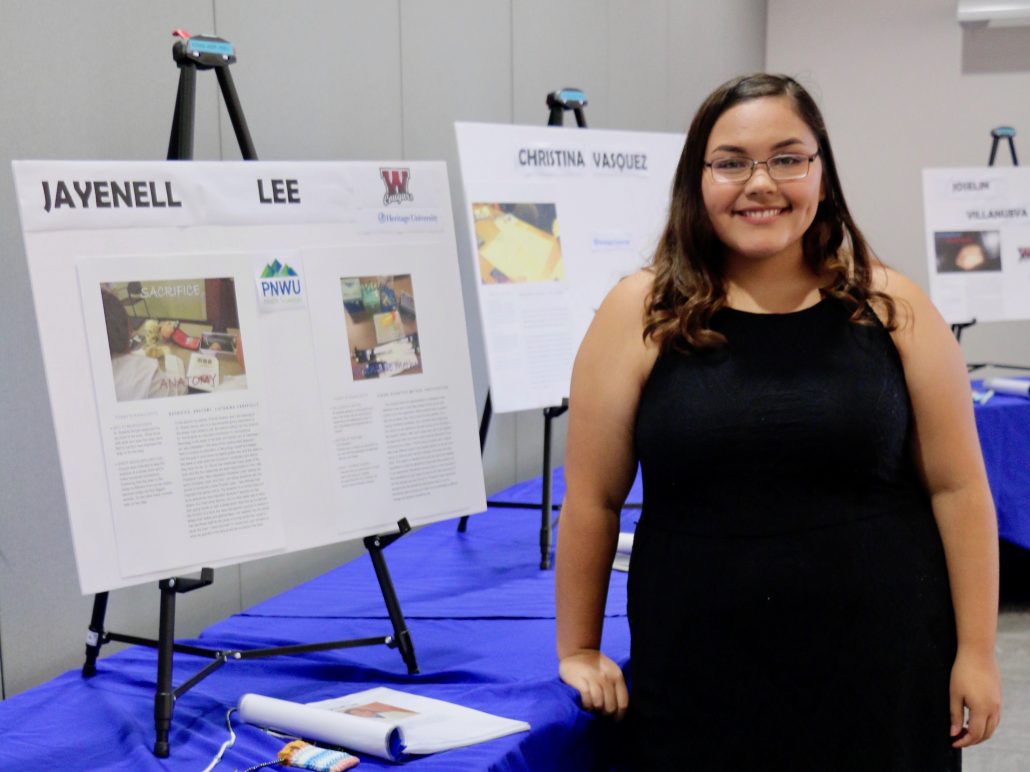
Students’ SPYS experience was capped off with the presentation of their research and journals. Pictured here is Jayenell Lee, a student at White Swan High School.
Students would reflect daily on their lessons and how those relate to their own culture. Tribal elders were present at each session to share their stories with the students. During their final week of labs, they worked with Ciarra Greene, a Nez Perce tribal member who is an expert in traditional ecological knowledge.
“As a Native educator, the value of integrating traditional knowledge as a basis for redirecting how we teach our youth throughout the SPYS program held and holds great merit for educational attainment,” said Maxine Janis, Heritage University associate professor, president’s liaison for Native American affairs, and co-coordinator of SPYS.
The summer science experience was part of a larger, on-going partnership between Heritage and PNWU to build the pipeline of Native American and Hispanic students studying the health sciences and moving into medical careers. Currently, only 6% of all medical school students in the United States are Latino(a). That percentage drops to a mere 0.3% for Native Americans students. This lack of representation negatively impacts health care, said Ramos-Diaz, especially in rural communities like the Yakima Valley where there are higher numbers of Native and Hispanic people.
“We know that having diversity in the medical field is crucial to providing good, quality health care,” said Ramos-Diaz. “Patients who receive care from someone who looks like them, understands their culture, values and traditions, are more likely to trust and feel comfortable with their health care provider and to follow through with their doctor’s instructions.”
The two universities started working together two years ago through an after-school program called Roots to Wings, which was founded by PNWU in 2013. Like SPYS, participating students are exposed to college and the health sciences through mentorship and hands-on learning. Roots to Wings is open to kids from the sixth through 12 grade who go to school in the Harrah or Mt. Adams School Districts or the Yakama Nation Tribal School. Up until this year, Roots to Wings students between the ages of 16 and 18 were able to travel to Washington D.C. to participate in a 10-week, paid Native American Summer Research Internship at the National Institute of Health (NIH). However, when the NIH changed their policy to participants had to be 18 or over unless they were accompanied by a parent or guardian for the duration of the experience, several Roots to Wings students who had been accepted were unable to go.
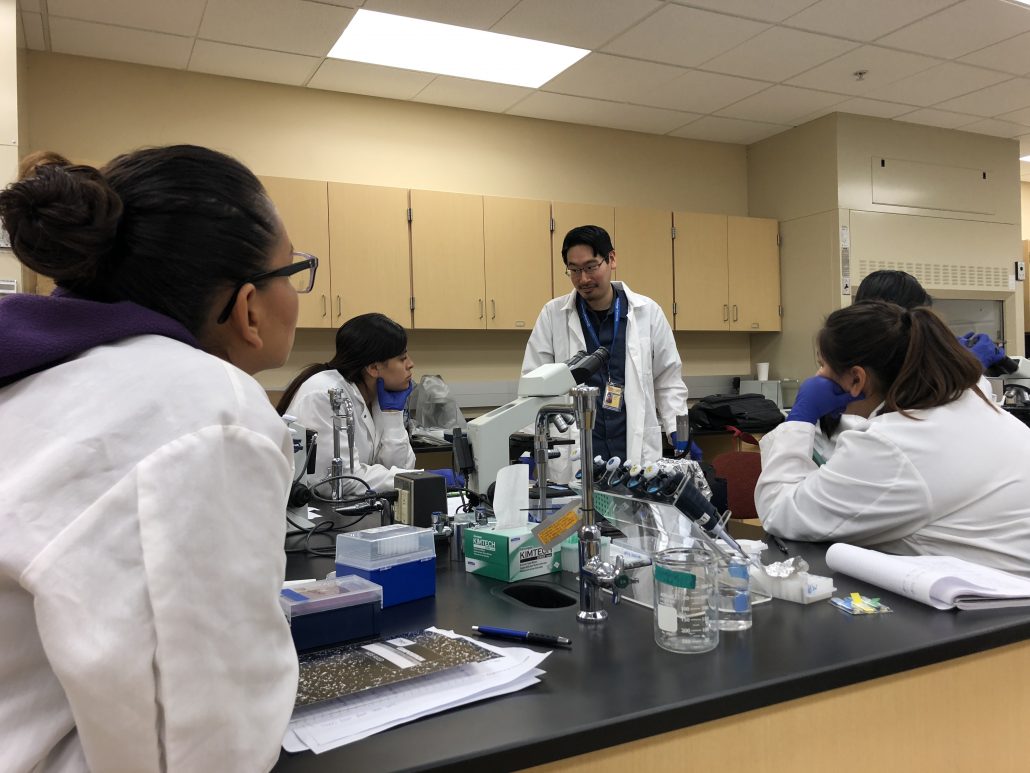
Heritage Assistant Professor in Biology Dr. Bob Kao led students through an introduction to the tools of the lab during their first week of SPYS.
That’s when the idea for SPYS came to be. Ramos- Diaz, Janis, and local Native American physician Dr. Naomi Lee had been talking for some time about ways to partner on outreach for Native youth in the lower Yakima Valley. When word came down that the Roots to Wings kids who were underage wouldn’t be able to travel to DC, the women started talking about what they could do to mirror the summer program locally. Lee had already designed a chemistry curriculum in anticipation of the partnership, which Ramos-Diaz used as a platform to build the SPYS curriculum. Funding the program was the next hurdle. Ramos-Diaz reached out to Dr. Rita Devine at NIH to see if funding could be made available to support the summer experience. The summer camp was a brand new concept for the NIH. They were intrigued and agreed to fund the experience. In a matter of a few weeks, SPYS was born.
“We wanted to create the same experience here in Yakima County that they would have gotten in DC, plus a little bit more,” said Janis. “We designed a curriculum that would challenge them with the science and help them build those soft skills, likewriting and working in teams, which will serve them throughout their academic careers. We also wanted to help them build their work ethic, so at the end of the experience, we paid them. In essence, this was their summer job.”
“We had all this great hands-on experience which was really cool,” said Vasquez. “And, we were getting paid to learn the things that we will be doing in the future.”
Looking back, said Ramos-Diaz, the policy change at NIH was a bit of a blessing in disguise. “Not every student is ready for the rigors of the NIH internship, the academic rigors as well as the stress of being so far away from home, separated from their families for so long,” she said. “Through SPYS they are able to strengthen their academic skills even further.”

Yakama Nation Tribal School students Eric Pebeashy, Trino Savala and Isela Cuevas record images and data of the organisms they are viewing through the microscopes.
And that, said Janis, is what it is all about, helping kids become stronger academics, to expose them to a world without limits, and to help them build the resiliency that will take them from high school to Heritage to PNWU and into the community where they will impact the health and well-being for us all.

